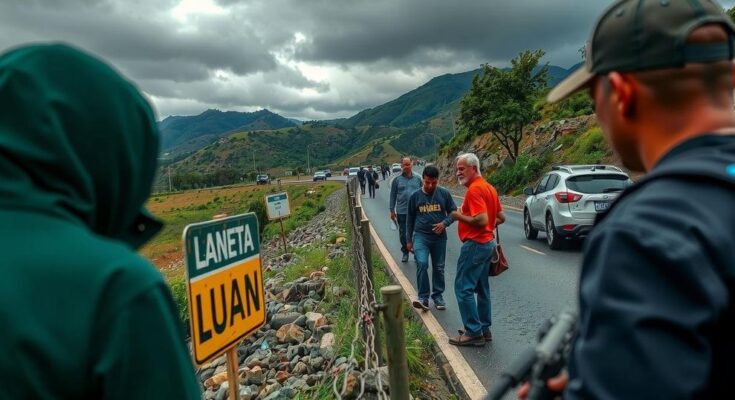The reopening of the Colombia-Venezuela border has not reduced smuggling activities as hoped, with criminal networks thriving on illicit trade. Markets remain constrained by distrust of authorities and corruption, compelling businesses to utilize illegal routes, for example, transporting goods like food where significant price differentials exist. Armed groups exert control over these smuggling operations, leading to escalated violence and extortion in local communities.
As night descends upon Cúcuta, a prominent border city in Colombia, the atmosphere becomes a veil for illicit activities. Criminal networks capitalize on the darkness, utilizing clandestine dirt paths that link Colombia to Venezuela for smuggling operations. Despite official attempts to curb these activities, smuggling remains rampant, with goods transported past law enforcement under the cover of night. A local business leader remarked, “While we sleep, countless things happen in the city. And yes, smuggling is one of them.” The Colombia-Venezuela border closed in February 2019 under President Nicolás Maduro’s directive following a failed humanitarian aid delivery by opposition factions. This closure transformed dirt tracks, known as “trochas,” into critical conduits for illegal trade and migrant trafficking, a phenomenon exacerbated by the COVID-19 pandemic which solidified these criminal economies. Despite the border’s official reopening on September 26, 2022, the anticipated restoration of lawful trade has not occurred. Criminal organizations continue to thrive, adapting to new conditions and shifting tactics to maintain profitability. After the border’s reopening, trade routes were revitalized, yet corruption and wariness of Venezuelan authorities impede normal trade operations. Cargo is still transported through illegal channels due to the efficiency and security they provide. This reluctance to engage fully in legal trade continues to fuel smuggling, with vast differences in commodity prices between Colombia and Venezuela compelling many to exploit illicit paths. For instance, milk purchased at $0.90 in Colombia can fetch nearly double in Venezuela, often lacking basic hygiene standards, while smuggled potatoes similarly bypass necessary quality controls. Conglomerates like the National Liberation Army (Ejército de Liberación Nacional – ELN) and Venezuela’s Tren de Aragua exert control over these smuggling routes. Despite the reopening, criminal dynamics have transformed with the ELN sustaining its revenue through extortion, while Tren de Aragua adapts by targeting businesses in Cúcuta for protection payments. This transition has ramped up violence within the city, exacerbated by increasing competition among armed groups seeking control over lucrative illicit markets, leading to a disturbing rise in violent incidents, including grenade attacks. The history of the Colombia-Venezuela border is steeped in political and economic turmoil, with closure and reopening marking cycles of burgeoning illicit trade. The impacts of corruption, systemic distrust, and deep-seated socio-economic disparities continue to forge a landscape rife with criminal issues and community suffering. In summary, while the reopening of the Colombia-Venezuela border was anticipated to diminish illicit trade, reality diverges as smuggling networks have resiliently adapted to maintain their influence. The consequences of such criminal enterprises have profound implications for local communities, illustrating the complexities surrounding border management and the challenges of fostering lawful trade in a fraught geopolitical context.
The Colombia-Venezuela border has been a tumultuous region, marked by political strife, economic disparity, and the rise of illicit trade. In early 2019, President Nicolás Maduro’s closure of the border significantly affected the flow of goods and people, turning covert dirt paths into vital smuggling routes. The recent reopening of the border in 2022 offered a glimpse of potential economic recovery; however, entrenched criminal networks have continued to exploit the situation, demonstrating resilience amidst shifting political landscapes.
The reopening of the Colombia-Venezuela border has not led to a cessation of smuggling activities as initially hoped. Instead, it has witnessed the evolution of criminal networks that continue to exploit illegal routes for profit. Armed groups like the ELN adapt by extracting extortion payments, while businesses face the dual challenge of corruption and distrust. The continued reliance on smuggling illustrates the complexities underpinning the region’s socio-economic dynamics, necessitating a multi-faceted approach to border management and law enforcement.
Original Source: insightcrime.org




